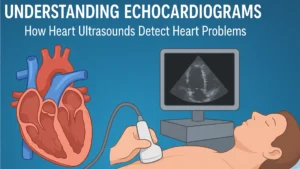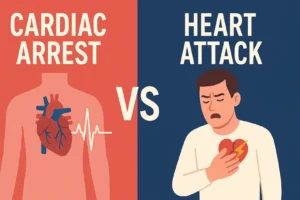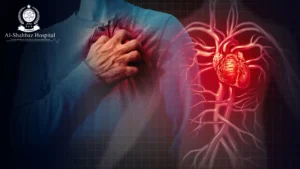Reaching your 50s marks a critical shift in cardiovascular health. According to the World Heart Federation, while age-standardized CVD death rates have improved, the overall prevalence of cardiovascular disease among people 55+ remains high (World Heart Federation). Stay heart healthy with diet, exercise, and lifestyle changes. In Pakistan, the burden of heart disease continues to rise. A Global Burden of Disease report recorded CVD incidence at 918 per 100,000 in 2019. (PMC)
Heart disease remains the leading cause of death globally, but with the right strategies, you can significantly reduce your risk and maintain optimal cardiovascular health well into your golden years.
The Critical Importance of Heart Health After 50
As we age, our cardiovascular system undergoes significant changes that make heart health increasingly important. According to the latest 2025 Heart Disease and Stroke Statistics from the American Heart Association, cardiovascular disease accounts for approximately 1 in every 3 deaths in the United States. More alarmingly, one person dies every 34 seconds from cardiovascular disease, with 919,032 people dying from heart-related conditions in 2023 alone. (CDC)
The risk of heart disease increases substantially after age 50. Research shows that men and women over 50 face higher cardiovascular risks due to age-related changes in their bodies’ response to lifestyle factors. However, studies indicate that up to 90% of heart disease is preventable through lifestyle modifications, making proactive heart health management crucial for this age group. (CVRTI)
Understanding Heart Health Changes After 50
Physiological Changes That Affect Your Heart
When you reach your 50s, several physiological changes occur that impact cardiovascular health:
Arterial Changes: Blood vessels naturally become less flexible and may narrow due to plaque buildup over time. This process, called atherosclerosis, increases blood pressure and forces the heart to work harder.
Heart Muscle Changes: The heart muscle may thicken slightly, and the maximum heart rate decreases. The heart’s ability to pump blood efficiently may also decline gradually.
Hormonal Shifts: Particularly for women, menopause brings significant hormonal changes that can affect cholesterol levels and blood pressure, increasing cardiovascular risk.
Metabolic Changes: Metabolism typically slows down, making weight management more challenging and potentially affecting blood sugar and cholesterol levels.
Expert Cardiologist Recommendations for Heart Health After 50
1. Prioritize Regular Physical Activity
The Exercise Prescription
Leading cardiologists recommend specific exercise guidelines for adults over 50. Aim for 150 minutes/week of moderate exercise or 75 minutes/week of vigorous activity (UnityPoint Health).
The American Heart Association suggests 150 minutes of moderate-intensity aerobic activity per week, which can be broken down into manageable sessions.
Optimal Exercise Routine:
- Cardiovascular Exercise: 40-50 minutes of brisk walking, swimming, cycling, or elliptical training at least 5 days per week (TODAY.com)
- Strength Training: 2-3 sessions per week focusing on major muscle groups
- Flexibility Work: Daily stretching or yoga to maintain mobility and reduce stress
Research from a Swedish study of over 20,000 men found that regular exercise, combined with other healthy lifestyle factors, led to an 86% lower risk of heart attack. (Reader’s Digest) The key is consistency rather than intensity – even moderate activities like gardening or dancing count toward your weekly exercise goals.
2. Adopt a Heart-Healthy Diet
Healthy Diet Approach
Cardiologists consistently recommend this diet pattern for heart health. Abdominal obesity drives metabolic syndrome and CVD risk. ( Wikipedia+Frontiers). This eating style emphasizes:
Foods to Include:
- Omega-3 Rich Fish: Salmon, mackerel, sardines 2-3 times per week
- Fruits and Vegetables: Aim for 5-9 servings daily, focusing on colorful varieties
- Whole Grains: Choose brown rice, quinoa, oats, and whole wheat products
- Healthy Fats: Extra virgin olive oil, nuts, seeds, and avocados
- Lean Proteins: Legumes, poultry, and plant-based proteins
Foods to Limit:
- Processed meats and excessive red meat
- Refined sugars and processed foods
- Trans fats and excessive saturated fats
- Excess sodium (aim for less than 2,300mg daily)
3. Manage Stress Effectively
The Stress-Heart Connection
Chronic stress significantly impacts cardiovascular health by increasing blood pressure, promoting inflammation, and potentially leading to unhealthy coping behaviors. Cardiologists recommend several stress management techniques:
Proven Stress Reduction Methods:
- Meditation and Mindfulness: Just 10-15 minutes daily can reduce cortisol levels
- Deep Breathing Exercises: Practice the 4-7-8 breathing technique regularly
- Regular Social Connection: Maintain strong relationships and social support networks
- Hobbies and Recreation: Engage in activities you enjoy to naturally reduce stress
4. Optimize Sleep Quality
Sleep and Heart Health
Quality sleep is crucial for cardiovascular health. Studies show that sleeping less than 6 hours per night significantly increases heart disease risk. Cardiologists recommend:
Sleep Hygiene Best Practices:
- Aim for 7-9 hours of sleep nightly
- Maintain consistent sleep and wake times
- Create a cool, dark, quiet sleep environment
- Limit screen time before bedtime
- Avoid caffeine and large meals close to bedtime
Poor sleep quality can lead to increased blood pressure, irregular heart rhythms, and higher levels of stress hormones, all of which contribute to cardiovascular disease risk.
5. Monitor and Manage Key Health Metrics
Essential Health Numbers to Track
Regular monitoring of cardiovascular risk factors becomes increasingly important after 50:
Blood Pressure:
- Target: Less than 120/80 mmHg for most adults
- Check regularly at home and during medical visits
- High blood pressure often has no symptoms, but it significantly increases heart disease risk
Cholesterol Levels:
- Total cholesterol: Less than 200 mg/dL
- LDL (bad) cholesterol: Less than 100 mg/dL
- HDL (good) cholesterol: 40 mg/dL or higher for men, 50 mg/dL or higher for women
- Triglycerides: Less than 150 mg/dL
Blood Sugar:
- Fasting glucose: Less than 100 mg/dL
- HbA1c: Less than 5.7% for non-diabetics
- Diabetes significantly increases cardiovascular risk
Body Weight:
- Maintain a healthy BMI (18.5-24.9)
- Focus on waist circumference: less than 40 inches for men, less than 35 inches for women
6. Quit Smoking
Smoking Cessation
Smoking is one of the most significant modifiable risk factors for heart disease. Smoking nearly doubles heart attack risk; benefits begin within 24 hours of quitting. (Mayo Clinic) The benefits of quitting begin immediately:
- Within 20 minutes, the Heart rate and blood pressure drop
- Within 12 months, the Risk of coronary heart disease is cut in half
- Within 5 years, the Stroke risk is reduced to that of a non-smoker
7. Consider Preventive Medications When Appropriate
Aspirin Therapy
The American College of Cardiology recommends that healthy adults ages 40-70 with high heart attack risk and low bleeding risk consider daily low-dose aspirin. However, this decision should always be made in consultation with your healthcare provider.
Statin Medications
For individuals with elevated cholesterol levels or high cardiovascular risk, statin medications may be recommended. These drugs can significantly reduce the risk of heart attacks and strokes when used appropriately.
8. Stay Hydrated and Maintain Electrolyte Balance
Hydration for Heart Health
Proper hydration supports cardiovascular function by:
- Maintaining blood volume and circulation
- Supporting kidney function
- Helping regulate blood pressure
- Preventing blood from becoming too thick
Aim for 8-10 glasses of water daily, adjusting for activity level and climate.
9. Regular Health Screenings and Check-ups
Preventive Care Schedule
After 50, regular medical monitoring becomes crucial:
Annual Screenings:
- Blood pressure checks
- Cholesterol and lipid panels
- Blood glucose testing
- Electrocardiogram (ECG) as recommended
- Stress testing is indicated
Preventive Imaging:
- Coronary calcium scoring for risk assessment
- Carotid artery ultrasound if indicated
- Echocardiogram for heart function evaluation
10. Build a Support Network
The Social Connection Factor
Strong social connections significantly impact heart health. Research shows that people with robust social support networks have:
- Lower rates of heart disease
- Better recovery from cardiac events
- Reduced stress levels
- Improved medication adherence
Building Your Support Network:
- Maintain regular contact with family and friends
- Join community groups or clubs
- Consider support groups for health conditions
- Engage in volunteer activities
- Participate in group exercise classes
Advanced Strategies for Heart Health After 50
Hormonal Considerations
For Women: Post-menopausal women should discuss hormone replacement therapy options with their healthcare provider, as hormonal changes can significantly impact cardiovascular risk.
For Men: Testosterone levels naturally decline with age, potentially affecting cardiovascular health. Regular monitoring and appropriate treatment can be beneficial.
Supplement Considerations
While a balanced diet should provide most nutrients, some supplements may support heart health:
Evidence-Based Supplements:
- Omega-3 Fatty Acids: May reduce inflammation and triglycerides
- Coenzyme Q10: May support heart muscle function
- Magnesium: Important for heart rhythm and blood pressure
- Vitamin D Deficiency is linked to increased cardiovascular risk
Always consult with your healthcare provider before starting any supplement regimen.
Technology and Heart Health
Modern Tools for Heart Health Management:
- Wearable devices for heart rate monitoring
- Blood pressure monitoring apps
- Fitness trackers for activity monitoring
- Telehealth consultations for ongoing care
Creating Your Personalized Heart Health Plan
Step 1: Assess Your Current Risk
Work with your healthcare provider to evaluate your current cardiovascular risk using tools like the American Heart Association’s risk calculator.
Step 2: Set Realistic Goals
Establish specific, measurable goals for:
- Physical activity levels
- Dietary changes
- Weight management
- Stress reduction
- Sleep improvement
Step 3: Implement Changes Gradually
Make sustainable changes by:
- Starting with small, achievable modifications
- Focusing on one area at a time
- Building habits gradually
- Celebrating progress along the way
Step 4: Monitor Progress
Track your progress through:
- Regular health screenings
- Daily activity monitoring
- Weight and blood pressure tracking
- Symptom awareness
Warning Signs to Watch For
Recognize these potential signs of heart problems and seek immediate medical attention:
Chest Pain or Discomfort: Especially during physical activity or stress. Shortness of Breath: Particularly during routine activities. Fatigue: Unusual tiredness during normal activities. Irregular Heartbeat: Palpitations or skipped beats.Dizziness, lightheadedness, especially with chest pain. Swelling: In legs, ankles, or abdomen
How Al Shahbaz Hospital Supports You
Cardiac wellness package: includes ECG, echo, stress test, calcium scan & lipid panel.Digital health portal for labs, records & teleconsultations.Renowned cardiology team available 24/7. Pulmonary, Diabetes, and Nephrology care linked under one roof.
Visit us at https://alshahbazhospital.com to learn more and book your Cardiac Wellness Package today.
Conclusion: Your Heart Health Journey After 50
Maintaining optimal heart health after 50 requires a comprehensive approach that combines regular physical activity, proper nutrition, stress management, adequate sleep, and regular medical care. While the risk of heart disease naturally increases with age, research consistently shows that lifestyle modifications can reduce cardiovascular risk by up to 90%.
The key to success lies in consistency, patience, and working closely with your healthcare team to develop a personalized plan that fits your unique needs and circumstances. Remember that small, sustainable changes made consistently over time can lead to significant improvements in cardiovascular health and overall quality of life.
Frequently Asked Questions (FAQs)
Q1: Is it too late to start focusing on heart health after 50?
A: Not! It’s never too late to improve your heart health. Studies show that even people who start healthy lifestyle changes in their 50s, 60s, or beyond can significantly reduce their risk of heart disease and improve their overall cardiovascular health. The heart has a remarkable ability to benefit from positive changes at any age.
Q2: How often should I get my heart checked after 50?
A: Adults over 50 should have comprehensive cardiovascular screenings annually, including blood pressure checks, cholesterol panels, and blood glucose testing. Your doctor may recommend more frequent monitoring based on your risk factors. An electrocardiogram (ECG) should be done every 1-3 years, and stress testing may be recommended based on your risk profile.
Q3: Can I reverse heart disease that’s already developed?
A: While you cannot completely reverse established heart disease, you can significantly slow its progression and even improve some aspects of cardiovascular health. Lifestyle changes can help stabilize plaque, improve blood flow, and reduce the risk of heart attacks and strokes. Some studies have shown that intensive lifestyle interventions can lead to regression of coronary artery disease.
Q4: What’s the difference between heart attack symptoms in men and women over 50?
A: Women over 50 may experience different heart attack symptoms from men. While both may have chest pain, women are more likely to experience:
- Shortness of breath
- Nausea or vomiting
- Back or jaw pain
- Extreme fatigue
- Dizziness. Men typically experience more classic symptoms like crushing chest pain and left arm pain.
Q5: How much exercise is safe for someone over 50 with existing heart conditions?
A: The amount and type of exercise depends on your specific condition and should be determined by your cardiologist. Generally, most people with stable heart conditions can safely engage in moderate exercise. Cardiac rehabilitation programs are excellent for people with existing heart disease, providing supervised exercise and education.
Q6: Are there any supplements that can replace heart medications?
A: No supplement should replace prescribed heart medications without your doctor’s approval. While some supplements like omega-3 fatty acids and CoQ10 may support heart health, they work best as complements to, not replacements for, proven medical treatments. Always discuss supplement use with your healthcare provider.
Q7: How does menopause affect heart health?
A: Menopause significantly increases cardiovascular risk due to declining estrogen levels. Estrogen helps protect the heart by maintaining healthy cholesterol levels and blood vessel function. After menopause, women’s risk of heart disease increases rapidly, making preventive measures even more important.
Q8: Can stress alone cause a heart attack?
A: While stress alone rarely causes a heart attack in healthy individuals, chronic stress significantly increases heart disease risk. Acute severe stress can trigger heart attacks in people with existing coronary artery disease. Managing stress through relaxation techniques, exercise, and social support is crucial for heart health.
Q9: What’s the ideal blood pressure for someone over 50?
A: The American Heart Association recommends a blood pressure target of less than 120/80 mmHg for most adults, including those over 50. However, individual targets may vary based on other health conditions. Some older adults may have slightly higher targets (130/80 mmHg) depending on their overall health status.
Q10: How do I know if chest pain is serious?
A: Seek immediate medical attention if you experience:
- Chest pain that lasts more than a few minutes
- Pain that spreads to your arm, neck, jaw, or back
- Chest pain accompanied by shortness of breath, sweating, nausea, or dizziness
- Pain that worsens with activity
- Any chest pain that feels different from previous episodes. When in doubt, call emergency services immediately.









